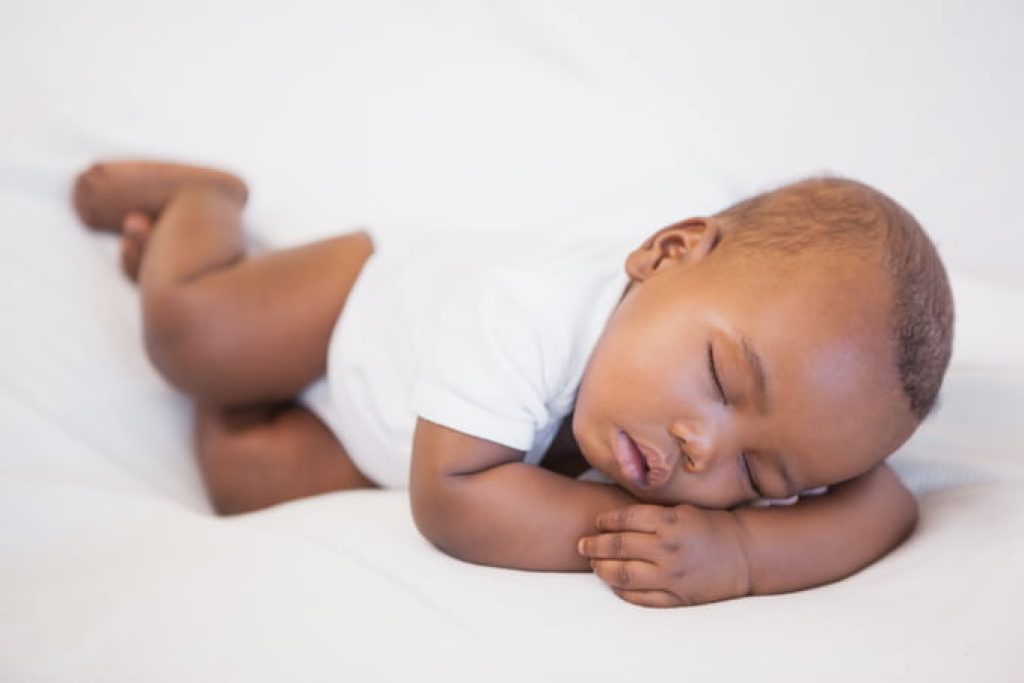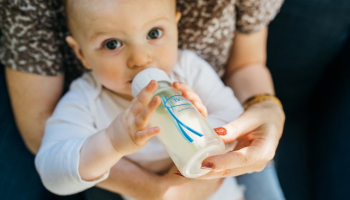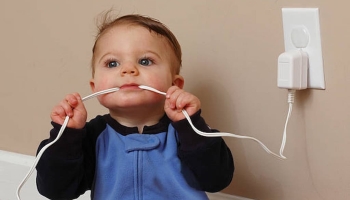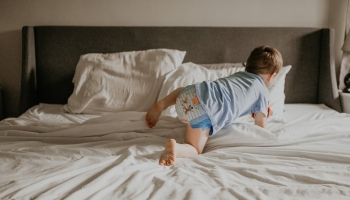
Parents of sick babies know all too well the struggle of trying to get their little ones to sleep. Whether it’s due to a stuffy nose, a fever, or other illness, a sick baby who won’t sleep can leave parents feeling exhausted and frustrated. While it’s normal for babies to have trouble sleeping when they’re sick, there are steps parents can take to help their little ones get the rest they need.
One of the most important things parents can do is to keep their sick child comfortable. This may mean adjusting the temperature in the room, using a humidifier, or using saline drops to help clear a stuffy nose. It’s also important to make sure the baby is dressed appropriately for the temperature and to keep them well-hydrated.
Another key factor in helping a sick baby sleep is to establish a consistent bedtime routine. This can include a warm bath, a gentle massage, and a lullaby or story before bed. By following a consistent routine, babies can learn to associate these activities with sleep and may be more likely to settle down and rest for night sleep even when they’re not feeling well.
Understanding Why a Sick Baby Won’t Sleep

When a baby is sick, it can be a challenging time for both the baby and their parents. One of the most common issues that parents face is a sick baby who won’t sleep. Understanding why this happens can help parents find ways to soothe their baby and help them get some much-needed rest.
Pain and Discomfort
When a baby is sick, they may experience pain and discomfort, which can make it difficult for them to fall asleep or stay asleep. This can be due to a variety of reasons, such as a high fever, ear infection, teething, or sore throat. Babies may also experience difficulty breathing or have stomach issues such as vomiting or diarrhea, which can further exacerbate their discomfort.
Dehydration and Temperature
When a baby is sick, they may also become dehydrated, which can make them feel irritable and anxious. Dehydration can also cause a high temperature, which can make it difficult for a baby to sleep. It’s important for parents to monitor their baby’s temperature and ensure they are drinking enough fluids to prevent dehydration.
Infections and Viruses
Babies can get a variety of infections and viruses, such as colds and the flu, which can make it difficult for them to sleep. In addition to the physical symptoms, such as a runny nose or cough, babies may also experience sleep disturbances due to their discomfort and irritability.
Sleep Deprivation
When a baby is sick, they may wake up frequently throughout the night, which can lead to more sleep deprivation for both the baby and their parents. This can further exacerbate the baby’s discomfort and make it harder for them to sleep.
Overall, a sick baby who won’t sleep can be a challenging issue for parents to deal with. Understanding the reasons behind the baby’s sleep disturbances can help parents find ways to soothe their baby and help them get the rest they need to recover.
Recognizing Sleep Patterns and Changes

As a parent, it is important to recognize your baby or child’s sleep patterns and changes in order to address any sleep issues they may be experiencing. Babies have different sleep needs and patterns than adults, so it is important to understand what is normal for them.
Newborns typically sleep for 16-17 hours a day, with periods of wakefulness lasting only a few hours. As they grow, their sleep patterns change and they start to sleep for longer stretches at night and take fewer naps during the day. By six months, most babies are sleeping through the night and taking 2-3 naps during the day.
It is important to establish a consistent sleep schedule for your baby, with a set bedtime and wake-up time. This helps regulate their sleep patterns and makes it easier for them to fall asleep and stay asleep. Sleep training can also be helpful in establishing good sleep habits.
However, babies may experience sleep regression, where they suddenly start waking up more frequently or have trouble falling asleep. This can be caused by teething, illness, or changes in routine. It is important to be patient during these times and stick to a consistent sleep schedule.
If your baby is consistently having trouble sleeping, it may be a sign that they are overtired or not getting enough sleep. Extra sleep during the day or an earlier bedtime may help address this issue.
Comforting and Soothing Techniques

When a baby is sick and won’t sleep, it can be a challenging time for both the baby and the parents. However, there are several comforting and soothing techniques that can help the baby feel more relaxed and comfortable, and hopefully, get some much-needed rest.
One of the most important things is to provide a warm and comfortable environment. This can be achieved by using a bassinet with a soft and cozy mattress, or by wrapping the baby in a warm blanket. A comfortable environment can help the baby feel secure and relaxed.
Cuddles and love are also essential to help soothe a sick baby. Holding the baby close and providing physical contact can help the baby feel safe and secure. Parents can also try baby massage techniques to help calm the baby and promote relaxation.
Using a sling or carrier can also be helpful in soothing a sick baby. The close physical contact can provide comfort and security, and the gentle movement can help lull the sick baby to sleep.
Distraction techniques can also be useful in helping a sick baby fall asleep. Soft music or white noise can help drown out any discomfort or pain the baby may be feeling, and can provide a calming background noise. Softly talking or singing to the baby can also be soothing.
Finally, relaxation techniques such as deep breathing or visualization can be helpful for both the baby and the parents. Taking deep breaths and focusing on relaxation can help calm the mind and body, and can help promote restful sleep for the baby.
Hydration and Feeding Tips
Ensuring that a sick baby stays hydrated and well-fed is crucial for their recovery. Here are some tips on how to keep a sick baby hydrated and nourished:
Breastfeeding
If the baby is breastfed, it is important to continue breastfeeding as much as possible. Breast milk contains antibodies that can also help your baby fight off infections and illnesses. If the baby is having trouble breastfeeding due to congestion or other symptoms, try using a nasal aspirator to clear their nasal passages before feeding.
Formula
If the baby is formula-fed, it is important to continue feeding them as usual. However, if the baby is vomiting or having diarrhea, it may be necessary to switch to a different formula that is easier for them to digest. Consult with a pediatrician before making any changes to the baby’s formula.
Liquids and Fluids
Offering the baby plenty of liquids and fluids is important to prevent dehydration. Water, clear broth, and electrolyte solutions like Pedialyte are good options. Avoid giving the baby sugary drinks or juices, as these can worsen diarrhea.
Hydration
To ensure that the baby is getting enough fluids, monitor their urine output. A well-hydrated baby should have at least six wet diapers a day. If the baby is not producing enough urine, it may be necessary to increase their fluid intake or seek medical attention.
Overall, it is important to follow a pediatrician’s recommendations when it comes to feeding and hydration for a sick baby. With proper care and attention, most sick babies will recover quickly.
Medication and Home Remedies
If a sick baby is having trouble sleeping, there are several medication and home remedy options that can help provide relief. It is important to consult with a pediatrician before administering any medication or home remedy.
Medications
Pediatricians may recommend over-the-counter pain relief medications such as Tylenol or Motrin to help alleviate fever or discomfort. It is important to follow the recommended dosage and not exceed the maximum daily limit. It is also important to note that certain medications may not be suitable for all infants and should only be given under the guidance of a healthcare professional.
Saline Drops
Saline drops can help relieve congestion in infants, which can make it easier for them to breathe and sleep. A few drops of saline can be administered into each nostril, followed by gentle suction with a bulb syringe.
Home Remedies
There are several home remedies that can help soothe a sick baby and promote sleep. These include:
- Elevating the head of the crib to help alleviate congestion.
- Providing a warm bath to help relax the baby.
- Using a humidifier to add moisture to the air and help alleviate congestion.
- Offering a pacifier to help soothe the baby and promote sleep.
It is important to note that home remedies should not be used as a substitute for medical treatment. If a baby’s symptoms persist or worsen, it is important to seek medical attention.
Creating a Restful Environment

When a baby is sick and won’t sleep, creating a restful environment can make a big difference. Here are some tips to help create a comfortable and soothing space for your little one:
- Use a cool-mist humidifier: A cool-mist humidifier can help keep the air moist and reduce congestion. Be sure to clean the humidifier regularly to prevent mold and bacteria growth.
- Keep the room quiet and dark: Babies are sensitive to light and noise, so try to keep the room as quiet and dark as possible. Use blackout curtains or shades if necessary.
- Use a warm bath: A warm bath can help relax your baby and make them feel more comfortable. Be sure to use a mild soap and avoid using hot water.
- Use their own bed: If possible, have your baby sleep in their own bed. This can help them feel more secure and comfortable.
- Use a comfortable mattress and bedding: Make sure your baby’s mattress is firm and comfortable. Use soft, breathable bedding that is not too warm or too cold.
- Use steam: If your baby is congested, you can use steam to help clear their airways. You can run a hot shower or use a steam vaporizer in the room (be sure to follow the manufacturer’s instructions).
By creating a restful environment, you can help your sick baby get the rest they need to feel better.
When to Seek Medical Attention

If a baby is not sleeping well, it can be a cause of concern for parents. In most cases, it is not a cause for alarm, but there are situations when it is necessary to seek medical attention.
If the baby has a fever, difficulty breathing, or is not eating, it is important to visit a pediatrician. These symptoms can indicate an underlying medical condition that needs to be addressed. Additionally, if the baby has not slept for an extended period, it is important to call the doctor.
If the baby is experiencing seizures or convulsions, it is crucial to seek medical attention immediately. These symptoms can be a sign of a serious medical condition that requires urgent care.
It is also important to visit the doctor if the baby has been sick for more than a few days and is not showing any signs of improvement. The healthcare provider can determine if there is an underlying medical condition that needs to be addressed.
In summary, if a sick baby is not sleeping well, it is important to monitor their symptoms and seek medical attention if needed. It is always better to err on the side of caution when it comes to a baby or child’s age and health.
Preventing Illness and Maintaining Health
Maintaining good health is essential for preventing illnesses in babies. A strong immune system helps to fight off germs and bacteria that can cause infections and illnesses. Parents can take several measures to boost their baby’s immune system, such as:
- Breastfeeding: Breast milk contains antibodies that can help protect babies from infections.
- Good hygiene: Washing hands thoroughly before handling the baby and keeping the baby’s surroundings clean can help prevent the spread of germs.
- Avoiding sick people: Keeping the baby away from sick people, especially during flu season (February), can help prevent the spread of illnesses.
- Proper sleep habits: Getting enough sleep is crucial for maintaining good health. Establishing a consistent bedtime routine and sleep associations can help babies develop healthy sleep habits.
In addition to these measures, parents can also use tools such as the Nose Frida or snot sucker to help relieve nasal congestion and a stuffy or runny nose. Night feeds or feedings can also help babies stay hydrated and nourished, which is essential for maintaining good health.
It’s important to note that while these measures can help prevent illnesses, they are not foolproof. Babies can still get sick despite the best efforts of their parents. In such cases, instinct and seeking medical attention as necessary can be the best medicine.
Frequently Asked Questions
What are some tips for helping a sick baby sleep?
There are a few things you can do to help your sick baby get some restful sleep. First, make sure the baby’s room is quiet and dark, and the temperature is comfortable. You might also try using a white noise machine or a humidifier to create a soothing environment. Additionally, you can try giving your baby a warm bath before bedtime, or gently massaging their back or feet.
Is it safe to let a sick baby sleep with me?
While it may be tempting to let your sick baby sleep with you, it’s generally not recommended. Co-sleeping can increase the risk of Sudden Infant Death Syndrome (SIDS) and other sleep-related accidents. Instead, try placing your baby’s crib or bassinet in your room, so you can be close by if they need you.
Should I let my sick child sleep all day?
When your baby is sick, they may sleep more, with newborns typically needing 14-17 hours overnight sleep and infants and toddlers around 12-14 hours daily. It’s vital to let them rest for recovery but equally important to ensure they’re hydrated and fed. If they’re sleeping excessively and missing feeds, or if you have dehydration concerns, consult a pediatrician.
Do babies sleep more when sick?
Yes, babies often sleep more when they’re sick. Sleep is the body’s way of healing and recovering, and you may notice that your baby is more lethargic or sleepy than usual when they are not feeling well. However, if you’re concerned about any symptoms or the amount your baby is sleeping, it’s always a good idea to consult with your pediatrician.
Should I wake my sick baby to eat?
This largely depends on the age of your baby and the duration of their sleep. For newborns and young infants, it’s usually recommended to not let them go for extended periods without feeding, even if they’re sick. You might want to wake them for feeds to ensure they’re getting the nutrition and hydration they need.
However, for older babies and toddlers, if they are sleeping through a usual feeding time due to illness, it’s typically alright to let them rest and offer food when they wake up. Always consult with your pediatrician if you’re unsure.








